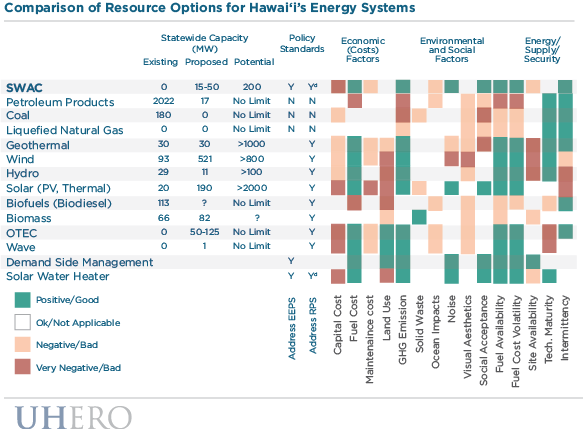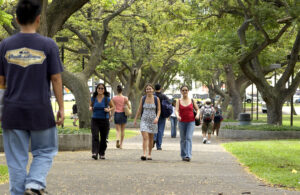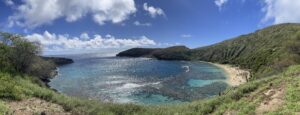Researchers at the University of Hawai‘i at Mānoa recently concluded a study into the potential for seawater air conditioning (SWAC) in Waikīkī. The study was led by the University of Hawai‘i Sea Grant College Program (UH Sea Grant) in partnership with the the Economic Research Organization at the University of Hawai‘i (UHERO) to investigate various aspects of seawater air conditioning and its applicability to Waikīkī. In examining the appropriateness of SWAC technology, researchers compared SWAC with ‘business as usual’ and various renewable energy and other energy efficiency options. Each option was analyzed in terms of: 1) generation capacity; 2) applicability to existing policy standards; 3) economic factors; 4) environmental and social factors; and, 5) energy and supply security.

According to the findings of the report, while SWAC may be more costly than other efficiency/conservation options, its ability to provide an uninterrupted supply of cool air gives it a solid advantage over the use of more intermittent renewable energy technologies (such as wind and solar power) for air conditioning purposes. For Waikīkī, where demand for air conditioning is constant, SWAC has the potential to decrease the cost of air conditioning and reduce the amount of harmful emissions that are released as a by-product of generating electricity from fossil fuels.
Traditional air conditioning systems require large amounts of energy to cool air to the desired temperature. In contrast, SWAC technology harnesses the cooling properties of cold seawater to achieve the same purpose, reducing the amount of electricity required. SWAC is particularly relevant to Hawai‘i, where the close proximity of deep, cold, ocean water to areas of high population make it an ideal location to implement the technology. In addition, the first seawater air conditioning unit was invented by a UH Sea Grant researcher in the early 1980’s.
When surveyed, 62 percent of O‘ahu residents indicated support for SWAC development in Waikīkī, compared to 8 percent opposed and 30 percent neither supporting nor opposing. Individuals more familiar with SWAC technology were more likely to support its development than those who were not aware of the technology (69 percent in favor compared to 54 percent). Slightly less than half of O‘ahu residents, 46 percent, also supported the use of public funds to help develop SWAC in Waikīkī, versus 26 percent opposed and the remaining 28 percent neither supporting nor opposing.
# # #
The University of Hawai’i Sea Grant College Program is part of the University of Hawai‘i at Mānoa’s prestigious School of Ocean and Earth Science and Technology. It supports an innovative program of research, education and extension services directed to the improved understanding and stewardship of coastal and marine resources of the state, region and nation. Science serving Hawai’i and the Pacific for over 40 years.
UHERO is a unit within the College of Social Sciences (CSS) at the University of Hawai‘i at Mānoa. Established in 1997, UHERO is dedicated to informing public- and private-sector decision making through rigorous, independent economic research on the people, environment and economies of Hawai‘i and the Asia-Pacific region.
The College of Social Sciences (CSS) at the University of Hawai‘i at Mānoa is engaged in a broad range of research endeavors that address fundamental questions about human behavior and the workings of local, national and international political, social, economic and cultural institutions. Its vibrant student-centered academic climate supports outstanding scholarship through internships, and active and service learning approaches to teaching that prepare students for the life-long pursuit of knowledge.






2 thoughts on “Investigating the Potential for Seawater Air Conditioning in Waikiki”
I go through with this article and I like the way you elaborate the topic, I appreciate your skills and ideas. Keep sharing such helpful articles with us.
Thank you for sharing this insightful article on seawater air conditioning in Waikiki. It’s fascinating to learn about sustainable solutions for cooling systems in such a beautiful and environmentally conscious location. Great work!